A Conversation With Yannis Philippakis of Foals, 2010
 I interviewed Yannis Philippakis [pictured right], singer/guitarist of the British pop act Foals, for Scene Magazine in late December 2010, ahead of their Australian tour as part of Laneway Festival 2011 (which I reviewed for The Vine).
I interviewed Yannis Philippakis [pictured right], singer/guitarist of the British pop act Foals, for Scene Magazine in late December 2010, ahead of their Australian tour as part of Laneway Festival 2011 (which I reviewed for The Vine).
Our interview originally ran in condensed form as the cover story of Scene Magazine #811. Here’s the full interview transcript.
Andrew: I’ve got a confession to make. [Foals’ second album] Total Life Forever is one of my favourite albums of 2010.
Oh, thank you very much.
I discovered [Foals’ 2008 debut album] Antidotes a couple of years ago, but Total Life Forever sounds like an entirely different band. I like this band more. Do you?
Yannis: It’s not a different band…
I know it’s not, but the sound definitely has changed quite a lot.
Yeah. I mean, I don’t really like the idea of making albums adversary to each other. I find the whole ranking, hierarchy that happens every year kind of repellent and equally… I don’t really have the same perspective on it, obviously, as an externalist, but to us in the band it’s a very linear progression. It never really felt like we had a break, even after we finished Antidotes. I think the production is a hell of a lot more fully realised on Total Life Forever. At least to me, I still have a fondness for a lot of the songs on Antidotes, but I don’t listen to that record largely because of the production. I think that it’s great that people are acknowledging the progression, but to us it is one linear thing. We want to make a body of work. It’s not us trying to eradicate our past, as such.
Was there any self-doubt within the band, when your style of song writing started shifting after Antidotes?
There’s self-doubt every day. Of course. Not to do with writing new things, but there’s just… most of them comes from a wish to complete something that isn’t whole. Self-doubt is part of the game. It’s been there always and unless we write ‘Symphony No. 3’ by Gorecki – which we can’t, because it’s already been written – I don’t think we’re ever going to feel sated or complete. It’s just part of the fun as well, the masochistic element of it.
The moment we stopped recording Antidotes, we started doing b-sides for Antidotes, it started to change a lot, and there was much more experimentation. We started to implement a lot of the things that we learned from Dave Sitek, and make stuff that I think actually bridges the two albums quite closely. There are some b-sides; one in particular called ‘Gold Gold Gold‘, and another two called ‘Titan Arum‘ and ‘Glaciers‘. That’s what I mean; it felt linear. It didn’t feel like we ever stopped, we just always worked on stuff.
All that really happened was that, at the beginning when we started the band, there was a very definite and conscious process. It was a conscious aesthetic, that we wanted, and it was to do with techno, it was to do with a style of guitar playing, a visual aesthetic. Everything was very conscious and we wanted to have parameters on it. We were in love with the idea of bands like Devo that had a distinct world that they occupied.
Everything since then, once we felt like we attained that, everything now is about undoing that process and getting to a point which is kind of the reverse of that, where nothing is conscious and if I had the choice, I’d have a lobotomy and cut out the conscious part of my mind, so that I could just make music direct from the gut. I don’t know. Did that answer your question?
For sure. You mentioned the style of guitar playing the band has. I’ve always been fascinated by those little needly, palm-muted riffs that you guys come up with. Were there any particular artists that inspired that style of playing?
I think it was just something that we heard. I think there are a lot of bands, a lot of styles of guitar or even just playing strings [instruments], everything from string players in a classical piece, to [‘math rock’] bands like OXES and Don Caballero, and African Senegalese guitar. I think the main thing, at least personally for me, there was something about that way of guitar playing that just attracted me. I was never that fascinated by chords, and I actually neglected to learn how to work chord sequences and stuff. Instead, everything became about these ‘guitar tattoos’. It was more I had a lot of different types of music and different types of bands and wanted to cannibalise it and make it our own.
That’s always been a main bit of the band. We start playing stuff lower down the guitar. We play with chords sometimes now, but I think that will always be part of the sound because that is just the way that I play, naturally. It’s become muscle memory, now.
It’s certainly one of the band’s most distinctive elements. Did you always intend that to be the case, or did it arise when you started playing together?
 You kind of progress, but yeah, it’s always been there, it predates the band. It’s how I learned how to play the guitar. I used to mimic and ape the guitar lines I liked, and they usually were like staccato, tight little phrases, that’s how I liked it. As I said, I was never really attracted to chords, or distortion pedals. I like the idea of a transparent guitar sound; a guitar sound that’s unashamed to be a clean guitar. I think that you can get as much power out of a clean guitar as you can out of a distorted guitar.
You kind of progress, but yeah, it’s always been there, it predates the band. It’s how I learned how to play the guitar. I used to mimic and ape the guitar lines I liked, and they usually were like staccato, tight little phrases, that’s how I liked it. As I said, I was never really attracted to chords, or distortion pedals. I like the idea of a transparent guitar sound; a guitar sound that’s unashamed to be a clean guitar. I think that you can get as much power out of a clean guitar as you can out of a distorted guitar.
You’ve been touring pretty heavily this year, as we discussed. You’ve played a lot of shows. I’m interested to know how you keep it sounding fresh and feeling fresh night after night.
Just do loads of drugs, basically. That’s pretty much it. [laughs] Do you mean like the shows, or the actual lifestyle, or my body odour? What do you mean?
The music. If you’re playing the same songs each night, does it feel like you’re doing the same thing over and over?
It depends. I definitely think there’s a point at which bands stop touring and sometimes you can’t tell when that point is going to be, and you have to keep on playing for a bit longer. But that rarely happens. Each show is different, and we don’t play exactly the same set every night. Even if we were playing a similar set, we have quite a lot of room to improvise… well not improvisation, exactly, but we have negative space that we’re allowed to do different things. We allow space for chaos in the set, so that it’s not so tightly rehearsed, that it’s mechanical. It’s not choreographed, in that way.
I think that helps keep it fresh. I get tired of touring sometimes, but it’s not really often to do with the shows, more to do with the kind of… I don’t know, I’d probably be able to answer that question later on in the year because we’ve still got two more tours [note: this interview was conducted in mid-December 2010]. At the moment I feel pretty good about playing. I’m starting to feel restless about writing new things. I’ve been writing so many things and I think the more that appetite opens, the more pedestrian touring seems in comparison. The further we get away from the completion of the last record, the more difficult touring becomes, I think. Not because of playing the same stuff, just because there’s a new appetite that emerges, of wanting to do things.
When I was researching for this interview, I was surprised to discover your age. You’re two years older than I am. Was it a challenge to get people to take a bunch of teenagers seriously when the band first started?
How old are you?
22.
What do you mean? For who to take us seriously?
People in the music industry, as you were getting introduced to labels, and so forth.
I don’t know. I think that for a lot of young bands, that’s when the prime is, sometimes. I think people are savvy to that in the music industry. They kind of want to feed off young blood. You have a naivety. You’re not jaded in any sort of way. I think, if anything, it wasn’t an issue of persuading them, it was more like trying to have them not suck our blood. I’m the youngest, but I wasn’t that young. We’ve all been playing in bands for a long time. I don’t know, I didn’t really feel that. I don’t feel as young as I used to, though.
Do you feel that as you get older you’re being taken more seriously?
It depends on what you mean. Are we talking about people that listen to records, are you talking about critics?
All of the above.
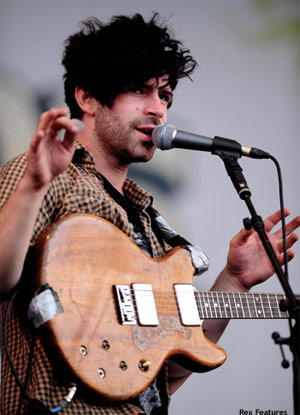 Yeah, I think so, in some way. I think the critics, there is something that make critics recoil if you seem like a young, cocky upstart. When we started doing interviews and stuff, I really didn’t have that much of a filter on my brain. A lot of time I really didn’t know where I was, in terms of how things would be relayed in the press. I think that with time comes an understanding. I understand myself better now. I think as you get older – what were you like when you were 19?
Yeah, I think so, in some way. I think the critics, there is something that make critics recoil if you seem like a young, cocky upstart. When we started doing interviews and stuff, I really didn’t have that much of a filter on my brain. A lot of time I really didn’t know where I was, in terms of how things would be relayed in the press. I think that with time comes an understanding. I understand myself better now. I think as you get older – what were you like when you were 19?
I was a dumbass.
[laughs] Things change. I think it’s not just to do with age. It’s to do with the fact that we made the second record, and hopefully it didn’t stink, and the people believe in you that little bit more because you’re not just putting out a hype record that, in theory, is a one-hit wonder, and also a compilation of songs that you spent 10 years to write. I think that we’ve conducted ourselves, at least since the beginning, in a way that we feel proud of, and hopefully people have a belief in a certain type of integrity – or an attempt at integrity – which will mean that we gain some respect in that field.
Yeah, sure. Before we finish up, I wanted to ask you about Oxford briefly. Earlier this year I came across a documentary called Anyone Can Play Guitar, which I note you’re involved with. I’m particularly interested in Oxford because I love both Ride and Swervedriver.
Right.
When you were growing up in the city, was there a sense of wanting to follow in the footsteps of other Oxford bands like those two perhaps?
Yeah, it wasn’t those two, but there were other ones. There was a band that was pretty much our contemporaries, but a little bit older: Youthmovies. Oxford definitely was like a big factor in the way we started to think about music. I obviously knew about Radiohead and Supergrass, but Ride and Swervedriver in particular, I wasn’t that aware of. When I was growing up I paid attention to local fledgling bands. Those bands [Ride and Swervedriver], I don’t think they were really playing Oxford when I was growing up, so I wasn’t that aware of them. A band called Youthmovies had pretty much the biggest influence on Oxford in general and people my age, and it’s still being felt now. I think it’s a very interesting place to live, if you’re not an academic.
Is there a sense of being able to give something back to the scene that helped foster Foals, now that you’ve got some attention?
Yeah, we take bands that we like on tour with us, and I try to talk about them in interviews. But not really out of a sense of… there’s nothing magnanimous about it, it’s just that we like the bands and a lot of them are our friends. I’d rather talk about my friends, because it’s more personal to me.
Last question. A friend asked me to say “pretty please, will you leak the Dave Sitek mix of Antidotes?”
[laughs] Ehh, maybe.
Okay, good. Thanks for your time mate.
A pleasure. Thank you.
++
For more Foals, visit their website. The music video for their song ‘Blue Blood‘‘ is embedded below.
Elsewhere: a review of their 2010 album, Total Life Forever, for The Vine.
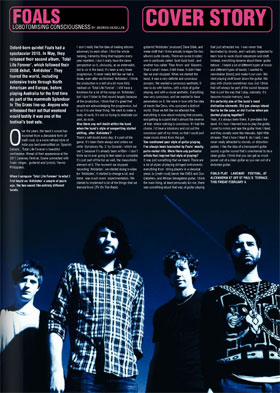
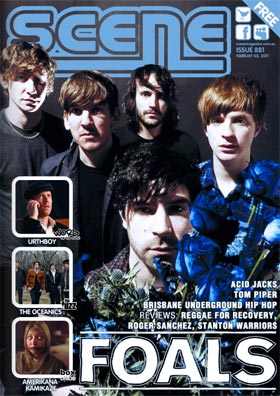 You mentioned your style of guitar playing. I’ve always been fascinated by Foals’ needly, palm-muted riffs. Were there any particular artists that inspired that style of playing?
You mentioned your style of guitar playing. I’ve always been fascinated by Foals’ needly, palm-muted riffs. Were there any particular artists that inspired that style of playing?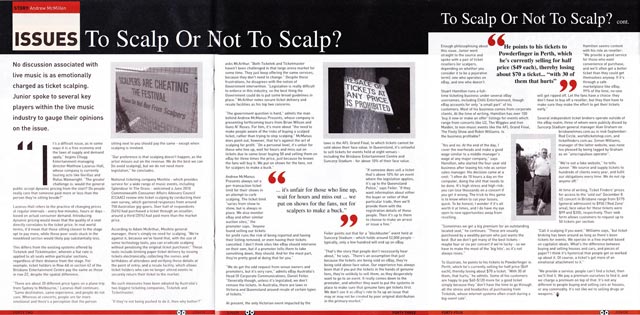
 Andrew McManus Presents always set a per-transaction ticket limit for their shows in an attempt to curb scalping. The ticket limit “varies from show to show, but is always in place. We also monitor eBay and other similar auction sites,” the promoter says. “Anyone found selling our tickets for profit runs the risk of being reported and having their listing removed, or even having their tickets cancelled. I don’t think sites like eBay should intervene on their own, but if a promoter tells them to take something down, they should. And for the most part, they’re pretty good at doing that for you.”
Andrew McManus Presents always set a per-transaction ticket limit for their shows in an attempt to curb scalping. The ticket limit “varies from show to show, but is always in place. We also monitor eBay and other similar auction sites,” the promoter says. “Anyone found selling our tickets for profit runs the risk of being reported and having their listing removed, or even having their tickets cancelled. I don’t think sites like eBay should intervene on their own, but if a promoter tells them to take something down, they should. And for the most part, they’re pretty good at doing that for you.”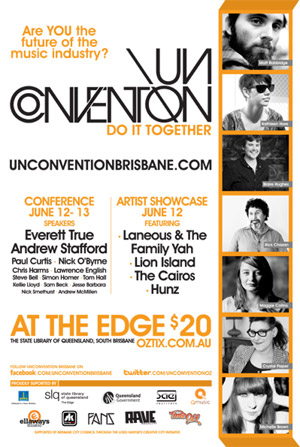
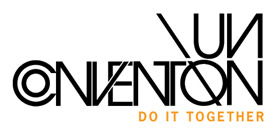 It’s a pleasure to be involved with an event that seeks to investigate how to sustain careers within Brisbane’s independent music industry. It’s important than ever to have these conversations. After spending a couple of years working in and around the local scene, I’m glad to be in a position to give something back.
It’s a pleasure to be involved with an event that seeks to investigate how to sustain careers within Brisbane’s independent music industry. It’s important than ever to have these conversations. After spending a couple of years working in and around the local scene, I’m glad to be in a position to give something back.